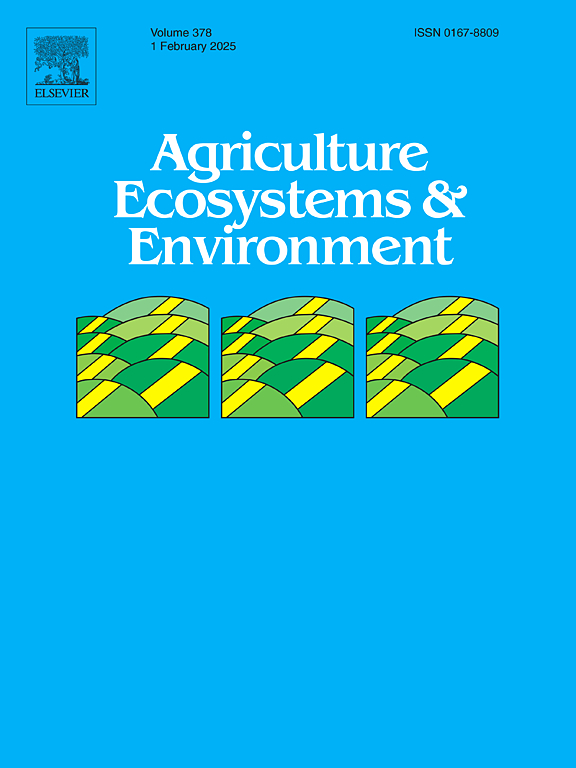Agroecological cashew cultivation increases pollinator abundance, diversity and flower visitation rates, with potential yield benefits
IF 6.4
1区 农林科学
Q1 AGRICULTURE, MULTIDISCIPLINARY
引用次数: 0
Abstract
Agroecological approaches have the potential to reduce the adverse impacts of agriculture on the environment whilst sustaining productivity, yet rigorous assessments of associated policies’ ability to achieve these dual aims at farm scale remain scarce. Here, we evaluate the impacts of the Zero Budget Natural Farming (ZBNF) programme – a large-scale government-led agroecological strategy in South India – on the ecological and productivity performance of an emerging commodity crop associated with high deforestation-risk: cashew (Anacardium occidentale L.). ZBNF increased the abundance and species richness of insects visiting cashew flowers (including known cashew pollinators) by almost 400 % and 250 % respectively, with visitation rates to cashew flowers rising nearly fivefold compared to conventional, agrichemical-based systems. Whilst there was strong support for these positive effects, estimates of their magnitudes were imprecise. Around 40 % of all species were exclusively found at ZBNF orchards. ZBNF’s effect on cashew nut yield was uncertain due to high variability in the data, yet our results indicate a positive trend, with yields averaging over 70 % higher under ZBNF. Thus, ZBNF likely enhanced cashew pollination service provisioning and had insect conservation benefits, although more targeted actions may be needed for rare, specialist species. Whilst ZBNF can help shift cashew production towards sustainability, we stress that it must be paired with land-use planning and strengthened conservation efforts to prevent further cashew expansion into natural ecosystems.
农业生态腰果栽培增加了传粉者的丰度、多样性和访花率,具有潜在的产量效益
农业生态方法有可能减少农业对环境的不利影响,同时保持生产力,但对相关政策在农场规模上实现这些双重目标的能力的严格评估仍然很少。在这里,我们评估了零预算自然农业(ZBNF)计划——印度南部政府主导的大规模农业生态战略——对腰果(Anacardium occidentale L.)这一具有高森林砍伐风险的新兴商品作物的生态和生产力表现的影响。ZBNF使到访腰果花的昆虫(包括已知的腰果传粉昆虫)的丰度和物种丰富度分别提高了近400 %和250 %,与传统的农用化学品系统相比,对腰果花的到访率提高了近5倍。虽然对这些积极影响有强有力的支持,但对其程度的估计并不精确。大约40% %的物种只在ZBNF果园发现。由于数据的高度变异性,ZBNF对腰果产量的影响尚不确定,但我们的研究结果表明,ZBNF对腰果产量的影响是积极的,平均产量在70% %以上。因此,ZBNF可能增强了腰果授粉服务的供应,并具有昆虫保护效益,尽管可能需要对稀有的专业物种采取更有针对性的行动。虽然ZBNF可以帮助腰果生产转向可持续发展,但我们强调,它必须与土地利用规划和加强保护工作相结合,以防止腰果进一步扩展到自然生态系统中。
本文章由计算机程序翻译,如有差异,请以英文原文为准。
求助全文
约1分钟内获得全文
求助全文
来源期刊

Agriculture, Ecosystems & Environment
环境科学-环境科学
CiteScore
11.70
自引率
9.10%
发文量
392
审稿时长
26 days
期刊介绍:
Agriculture, Ecosystems and Environment publishes scientific articles dealing with the interface between agroecosystems and the natural environment, specifically how agriculture influences the environment and how changes in that environment impact agroecosystems. Preference is given to papers from experimental and observational research at the field, system or landscape level, from studies that enhance our understanding of processes using data-based biophysical modelling, and papers that bridge scientific disciplines and integrate knowledge. All papers should be placed in an international or wide comparative context.
 求助内容:
求助内容: 应助结果提醒方式:
应助结果提醒方式:


